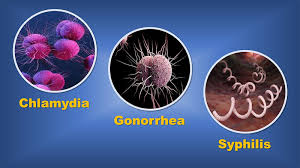
Sexually transmitted infections (STIs), also known as sexually transmitted diseases (STDs), are infections that can be transmitted through sexual contact. They can affect people of all genders and sexual orientations.
Caused by the bacterium Chlamydia trachomatis, it often presents with no symptoms but can lead to pelvic inflammatory disease (PID) and infertility if left untreated.
Caused by the bacterium Neisseria gonorrhoeae, it can cause a range of symptoms, including painful urination and discharge. Untreated gonorrhea can lead to serious complications.
Caused by the bacterium Treponema pallidum, it progresses through stages and can cause a variety of symptoms, including sores, rashes, and organ damage if left untreated.
Caused by the herpes simplex virus (HSV), it results in painful sores or blisters on or around the genitals or mouth. There is no cure, but antiviral medications can manage symptoms.
A group of viruses that can cause genital warts and are linked to several types of cancer, including cervical cancer. Vaccines are available to prevent some HPV-related cancers.
The human immunodeficiency virus (HIV) attacks the immune system and, if left untreated, can lead to acquired immunodeficiency syndrome (AIDS). Antiretroviral therapy (ART) can help manage HIV and prevent progression to AIDS.
The most effective way to prevent STIs is to abstain from sexual activity.
Consistently and correctly using latex or polyurethane condoms during sexual activity can reduce the risk of many STIs.
Vaccines are available to prevent some STIs, such as HPV and hepatitis B.
Regular STI testing is essential, especially if you have multiple sexual partners or engage in high-risk behaviors.
Reducing the number of sexual partners can lower the risk of exposure to STIs.
Avoiding high-risk sexual activities and using barrier methods, like dental dams or condoms, during oral, anal, and vaginal sex.
Bacterial STIs like chlamydia, gonorrhea, and syphilis can often be treated and cured with antibiotics. It’s essential to complete the entire course of antibiotics as prescribed by a healthcare provider.
Viral STIs like herpes and HIV cannot be cured, but antiviral medications can manage symptoms and reduce transmission.
Follow-up with a healthcare provider for testing and treatment if you are diagnosed with an STI. Some STIs may require repeat testing to ensure treatment was successful.
If you test positive for an STI, it’s crucial to inform sexual partners so they can also get tested and receive treatment if necessary.
If you have an STI, practice safe sex to prevent transmission to your partner, and use condoms consistently.
Vaccination is available for some STIs like HPV and hepatitis B, and it can prevent infection.
It’s essential to prioritize safe sexual practices and get tested regularly if you are sexually active to protect your sexual health and the health of your partners. If you suspect you have an STI or have been exposed to one, seek medical attention promptly to receive appropriate testing and treatment. Early detection and treatment can prevent complications and reduce the spread of STIs.
WhatsApp us